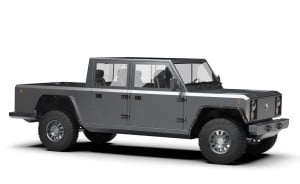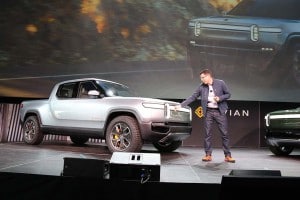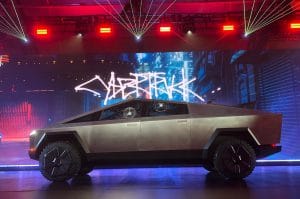
Tesla’s new Cybertruck lived up to Elon Musk’s description: it’s unlike anything else in its segment.
Few new products have generated the level buzz touched off by last week’s unveiling of the Tesla Cybertruck.
Tesla is betting there’ll be significant demand for an all-electric pickup, but it’s not alone. At least seven other manufacturers, including established brands like General Motors and Ford, also are entering the market with battery trucks. So are some start-ups, such as Rivian and Bollinger.
The question is whether there’s a market to absorb all those new entries. But with Tesla claiming to have received about 200,000 advance orders already, there could be a potentially lucrative market for at least some of the new offerings.
Tesla CEO Elon Musk has been hinting for more than a year that the automaker would bring a new, all-electric pickup to market, but few expected the radical design the California automaker unveiled last Thursday. The wedge-shaped Cybertruck has generated a sharply polarized response, critics deriding the design but proponents arguing that it will transform one of the most staid segments in the U.S. automotive market.
(Click Here for a first look at Tesla’s Cybertruck prototype.)
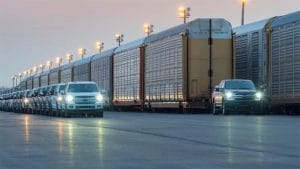
A prototype of Ford’s upcoming, all-electric F-150 hauled 10 double-decker rail cars and 42 trucks for this stunt.
So far, Tesla claims it has received 200,000 early reservations, each requiring a $100 refundable deposit. How many of those will translate into sales is far from certain, especially since it will be at least two years before the Cybertruck goes into production – and with Tesla only planning to produce about 50,000 annually. Meanwhile, there’ll be plenty of competition aiming for the same new niche.
The existing market for full-size pickups is a big one, generally accounting for anywhere from 11 to 15% of total U.S. new vehicle sales each year. Indeed, the three best-selling vehicles on the market are the Ford F-Series, the Chevrolet Silverado and the Ram truck.
Detroit automakers have long dominated the full-size market –selling 94% of the 1.85 million trucks sold during the first three quarters of 2019 — despite efforts by both Nissan and Toyota. They’d like to retain that dominance, even with the arrival of all-electric drivetrain technology. While it remains unclear what Fiat Chrysler’s long-term plans are to electrify the Ram line, both GM and Ford have confirmed they will have all-electric models of their own, both arriving at roughly the same time as the Tesla Cybertruck.
(Chevy shows off battery-electric E-10 pickup concept at SEMA.)
Following the debut of the Cybertruck, Tesla released a video showing the pickup dragging a Ford F-150 to underscore its capabilities. But Ford also plans to make use of the incredible torque electric motors can deliver and, in August, gave a hint of what its own battery truck will be capable of doing when it replaced a video showing a prototype hauling 10 double-decker rail cars and 42 conventional F-150 pickups – a load of more than 1 million pounds.
While neither Ford nor GM have released specifications, “You have to expect (their) towing capacity would be more like the Silverado (or F-150), in excess of 11,000 pounds,” said Sam Fiorani, the head of Global Vehicle Forecasting, AutoForecast Solutions.
What’s equally uncertain is whether the two Detroit automakers will stick close to the design of their existing pickups or opt for something more in line with the radical new Tesla truck.
Also uncertain is whether they will target existing buyers or go after entirely new customers, something that analysts are suggesting Tesla may do.
While there are challenges to going electric – such as range and charging — one of the potential pluses for commercial users, especially fleet buyers, is the lower cost of operating and maintaining EV trucks. Charging at off-peak hours could mean significant savings on energy. And battery trucks won’t need oil changes and conventional tune-ups, though it remains to be seen how they’ll hold up to work truck type abuse.
Several of the new entrants in the field are targeting just that sort of application, however, including Bollinger, the suburban Detroit start-up that offered the first public viewing of its B2 pickup (and B1 SUV) at the Los Angeles Auto Show last week. The B2 is rated a heavy-duty Class 3 model, like Ford’s F-350 line, something that translates into a payload of 5,000 pounds and towing capacity of 7,500 pounds, with 10,000 pounds gross weight.
Its 120 kilowatt-hour battery pack will provide enough energy for 200 miles of driving when loaded up. And the B2 also is expected to deliver about 10 hours operating time off-road. While not quite a Tesla running in Ludicrous Mode, Bollinger claims the truck will manage to hit 60 mph in 4.5 seconds thanks to twin motors – one on each axle – each pumping out 307 horsepower and 334 pound-feet of torque.
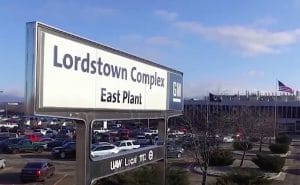
Start-up Lordstown Motors plans to produce its own all-electric pickup at the old GM Ohio assembly plant.
Then there’s Rivian, another Detroit start-up, which, like Bollinger, is bringing out both an electric SUV and a pickup. The latter, the R1T, will be more akin to a Ford F-150, with up to 400 miles range and 11,000 pounds of towing capacity, according to CEO R.J. Scaringe. Performance, meanwhile, will rival a Tesla SUV with Ludicrous Mode, Scaringe claiming the two trucks will hit 60 in 3 seconds and 100 in less than 7 seconds, with a top speed of 125 mph.
Rivian has generated a significant amount of interest since showing off its two electric models at the 2018 L.A. Auto Show. That includes a $750 million investment by a consortium including Amazon – the cyber-retailer also announcing plans to buy 200,000 commercial delivery vans from Rivian. Ford, meanwhile, has invested $500 million in the start-up and plans to use Rivian technology for an upcoming SUV – though not for the electric F-Series pickup it is developing.
Looking further ahead, several other new entrants hope to get into the electric pickup market, including both Detroit-based Hercules Electric Vehicles and Atlis Motor Vehicles, a Mesa, Arizona start-up. Their new models are expected to run anywhere from $45,000 to $125,000. Then there’s Lordstown Motors which, this past month, formally acquired the abandoned GM plant in Lordstown, Ohio. It is expected to have its own pickup in production a year from now, at a starting price of $52,500.
(GM completes sale of Lordstown plant for new electric pickup manufacturer.)
If anything, we could yet see another player enter the field. Nissan has already launched a smaller, all-electric pickup in China, a product developed in cooperation with its Chinese partner Dongfeng. Now, the automaker is indicating it is exploring the need for an electric option on its U.S. trucks which could include either the midsize Frontier or full-size Titan, and possibly both.
For the moment, those planning to enter the electric pickup truck have laid out – or at least hinted at – modest aspirations. But, even then, if all the new plans come to fruition, that could see the industry trying to move close to 500,000 of the vehicles annually, roughly a quarter of today’s full-size trucks. Whether there’d be a market for that many battery pickups is far from certain. And, if buyers do turn on to them, the question is whether they will replace existing, gas and diesel trucks or draw in an entirely new buyer.

